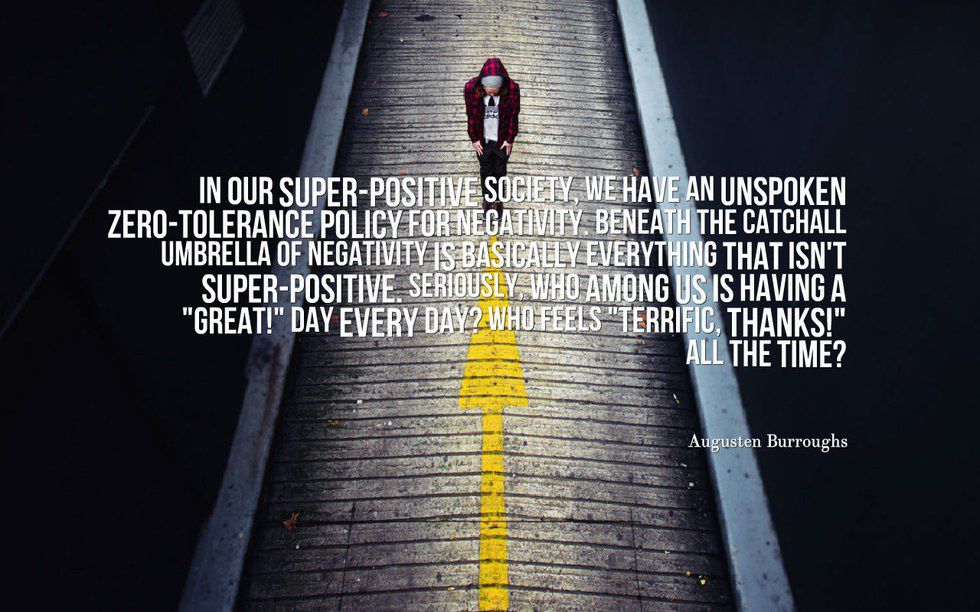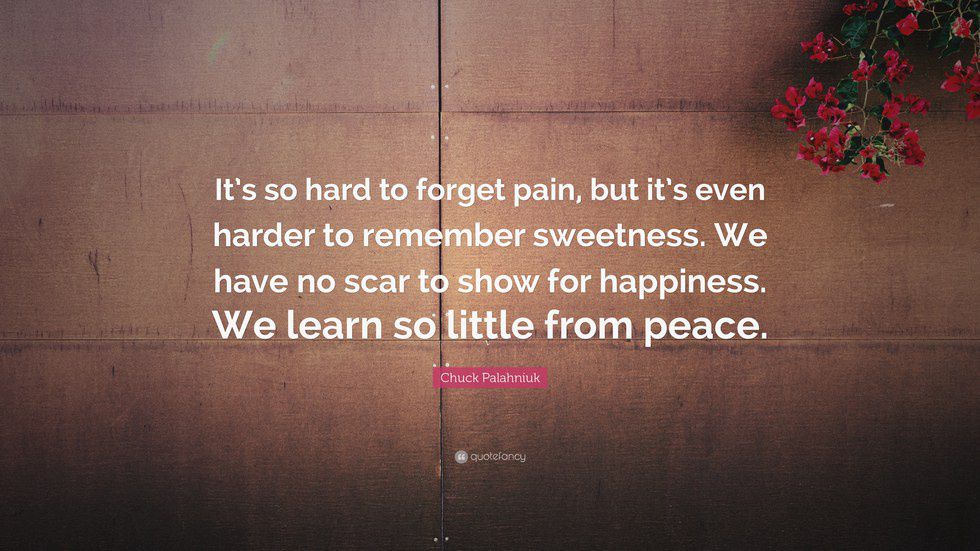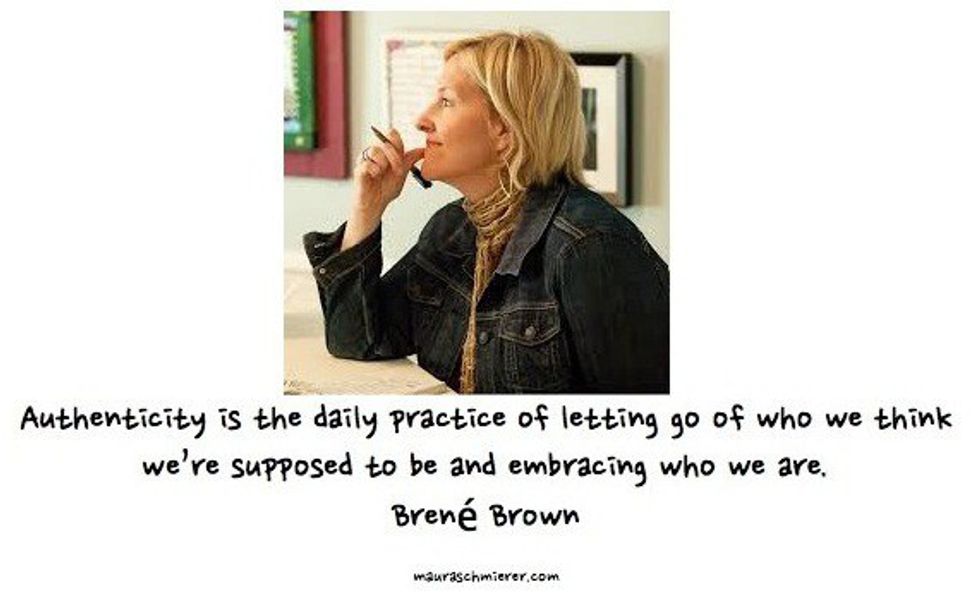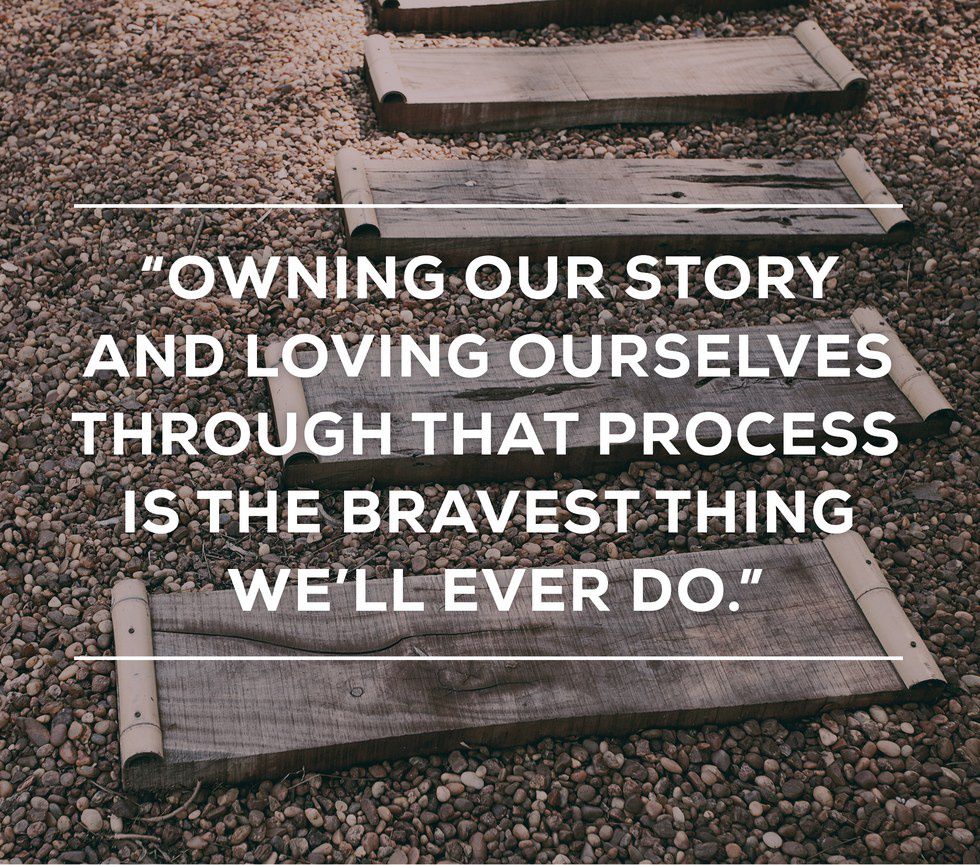In order to learn more and grow as a person, you need to acknowledge things that exist that you might not like. Grief. Dissatisfaction. Hurt. Unhappiness. Things that make us uncomfortable.
This is part of expanding perception.
In her Ted Talk "The Power of Vulnerability," Brené Brown speaks to the problems with our culture that inhibit human connection. Shame, she says, is the largest obstacle;
"The things I can tell you about it [shame]; it's universal, we all have it. The only people who don't experience shame have no capacity for human empathy or connection. No one wants to talk about it. And the less you talk about it, the more you have it."
Shame, Brown says, "is a fear of disconnection." A fear based on something being wrong with who you are in your current state.
I'm too fat, I'm too thin, I'm too weird, I have too much acne.
I'm not good enough.
All of these insecurities make us vulnerable. We, as a society, have a fear of being vulnerable.
Being vulnerable means exposing yourself, flaws and all, which brings the potential for outside ridicule. Some "flaws" are physical and more visible than others. If you're self-conscious about your weight, for example, that can become a source of shame and it's likely that it cannot be hidden from prying eyes.
Say you also struggle with your mental health. Maybe you see a therapist or take some sort of medicine. This is a potential source of shame that is not visible. While it makes it potentially easier to hide, it's easy with all the stigmas surrounding mental health to internalize shame.
Internalizing shame is what happens when you take the values of the outside world - whether wrong or right - and make them so ingrained in your own value system that you begin to ridicule yourself.
It's guaranteed that this will happen multiple times in your life. But not only do we pretend that shame doesn't happen, we don't give anyone the tools to navigate it.
The first thing we need to do is allow ourselves the space to deal with a range of emotions.
We've all had that problem, particularly during the holiday season. You've had a rough day or couple of weeks. Your cat died. You got in a car accident. You're having a life-crisis and no longer know what you want to major in.
You show up at your relatives' house and they ask, "How are you?" And you have to stop yourself from saying how you really feel.
Start counting how many times you have to stop yourself in a week. It adds up.
You see it in family interactions and politics alike. People are so focused on how things are presented that it's the only thing they care about. You might fundamentally agree that black folks shouldn't be disproportionately profiled and incarcerated by the police, but because people are responding with anger, they're shut out.
How many times do you hear, "I agree with them, I just don't agree with how they're doing it. So I don't support them."
Sometimes anger is deserved and sometimes maybe it's not a good idea to tell a black person how to feel about racism, but that's another conversation.
The point I'm trying to get at is that anger and sadness and other "negative" emotions aren't childish. They're colored to be that way by how we cover the news, the way we interact with each other and the lofty expectations of zero-calorie happiness we set in our lives.
What's really childish is pretending like none of these "negative" emotions exist.
In an excerpt from his self-help book, "This is How," Augusten Burroughs writes on the uses of confronting uglier emotions head on;
"Instead of trying to alleviate some of the uncomfortable and unpleasant emotions you feel by 'trying to be positive,' try being negative instead. Seriously, try it sometime. This will help you get in touch with how you actually feel: 'I feel hopeless and fat and stupid. And like a failure for feeling this way. And trying to be positive and upbeat makes me feel angry and feeling angry makes me feel like I am broken.'"
Remember when I said to keep track of the number of times you have to stop yourself from telling anyone how things are really going? Now ask yourself, who are you telling about your struggles? Are you carrying it all on your own back? How are you dealing with that? Are you putting it off?
Because you're going to have to deal with it eventually.
What makes you feel vulnerable? For me, it's:
Asking my boss for clarification.
Asking my parents for help.
Admitting I need advice.
Having to socialize in a room full of strangers and casual acquaintances. Holidays, anyone?
Running a creative idea by someone who's input I respect.
Going to a job interview.
Arriving to the restaurant before all your friends.
...among other things.
Back in her Ted Talk, Brown tells us, "You cannot selectively numb emotion. You can't say, 'Here's the bad stuff. Here's vulnerability, here's grief, here's shame, here's fear, here's disappointment: I don't wanna feel these. I'm gonna have a couple of beers and a banana nut muffin.'"
Numbing the bad means numbing the good. You can't feel grateful for something when you don't acknowledge that you were in a tough spot in the first place. Happiness and the good emotions will not be handed to you on a silver platter - they are the result of working through the dredges of progress and insecurity.
Everyone wants to feel secure. We all want to know where want to live, what job we want for the next thirty-some years and who we want to be with right now.
If we spend less time trying to control the rest of our lives before we've even been exposed to the world, we will allow more experiences to enter our perception and inform our understanding of each other. Sometimes this is uncomfortable
But if we spent more time in our lives going out of our comfort zones and making ourselves feel less certain about what we think we know, we would be in a better place.
The real reason happiness is fleeting is because it isn't instructive - pain sticks around longer until we decide to confront it and learn from it.
You don't have to like being vulnerable. You don't have to like being open to the world. You don't have to show your vulnerability by broadcasting either. But you're going to have tough times. As Brown says, "We are hard-wired for struggle." You're going to have to know what to do with that struggle.
So how do we change things?
1. We have to change the end goal.
In Burroughs' piece, he talks about striving for wholeness instead of happiness.
Everyone wants to be happy - there's nothing more unoriginal. But you have to actually sit down and take stock of what that really means for you. For some people, it's material things, which is fine. For others, it's a deep sense of fulfillment, and - as Brown would argue - a sense of love and belonging.
These more abstract ideas - love, belonging, acceptance, worthiness - you will always find them in the most unlikely places. If you allow yourself to be vulnerable and go after things you wouldn't normally do, your whole world will open up. And sometimes it won't necessarily be fun but it will always be engaging and there will always be a takeaway.
Audition for that role you're scared of in the play. Write a lyric essay for your creative non-fiction class. Have that conversation you've been dreading with your parents.
Because there is a certain amount of discomfort that comes from these situations, these are not things we see as leading us to happiness at first glance. Happiness is not sustainable. It doesn't last. Wholeness is about creating a sustainable understanding from a grounded reality and the reality is that some days, you will struggle.
2. We have to accept things we cannot control
You will never be happy all the time. Accept it. Stop trying to control it. Things will happen and they will suck more than you can believe. Sometimes, they'll happen for no reason and that blows. We've all been through our shit in our lives.
Through Brown's research, she
By embracing the parts of our stories that are uncomfortable and unchangeable, we are able to put the author's pen back in our own hand. We can give ourselves a voice. But maybe we also need to re-write the ending.
3. We have to recognize what we can control and choose better.
"You make choices in this world based on two things: fear or confidence.
You either choose to do something because you are confident in the outcome or you choose not to do something because you're afraid it won't go the way you want it to."
This advice was given to me by a dance instructor I had years ago. I've heard many clichés with a similar tune, such as "wanting it bad enough," and "fight or flight."
But this is the first version I'd heard that mentioned choice.
The thing about phrases like "fight or flight" is that they're used to describe instincts, which are things beyond our full understanding. Beyond our full control.
The thing about choices is that they're conscious decisions you make. You control whether you do it or not.
When we're afraid of things, we avoid them. That's a choice. Avoidance is a conscious action. Numbing is a conscious action.
Nothing will be achieved from putting the inevitability of your negative emotions into a box and trying hide it in the recesses of your mind. It's never going to work.
Feeling fulfilled in life is tricky. But the less emphasis we put on shutting out everything that isn't good small talk conversation and the more emphasis we put on living wholly and accepting the not-always-perfect realities we all face, the more we will develop a culture of compassion, connection and empathy. And I think that's something we're greatly missing right now.


























